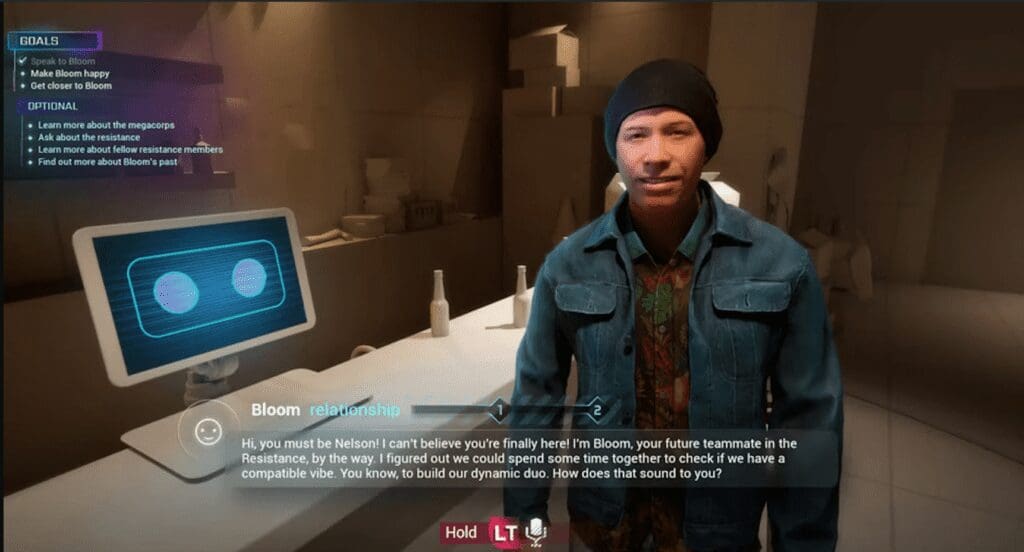
At GDC 2024, AI takes center stage as Convai, NVIDIA, and Ubisoft reveal intriguing gameplay powered by artificial intelligence. GDC 2024 offers a glimpse into the future of AI and gaming.
Convai demos show the potential of conversational gameplay with AI bots that can guide novice players, provide battlefield intel, and have compelling conversations. In the Convai demo “Second Life”, AI bots act as guides for new players, teleporting them to locations and generating items like surfboards on demand. The bots have environmental awareness, knowing locations around them, and long-term memory, recalling player visits, to enhance the immersive experience.

“Stormgate”, an upcoming real-time strategy game, features an AI character, Dr. Fletcher, who offers lore and battlefield hints to players. She doesn’t participate directly but her commentary and backstory additions encourage engagement.
RELATED: The Pokémon Company International SHUTS DOWN Rom Free Fan Games, Relic Castle DMCA’d Off The Net
The most impressive Convai demo is “Project Neural Nexus.” In a cyberpunk world, an AI guide named Seraph leads the player through the streets. Conversations feel dynamic as characters knowledgeably discuss the world and objects, and even respond to unusual questions without losing stride.
An assassin named Mae Liang debates the relevance of the Geneva Conventions to her work, giving a shockingly interesting perspective. A hostile robot named WENDY elicits a strong reaction by aggressively insulting players. The AI conversations increase immersion through their depth and unpredictability.
RELATED: Xbox Doubles Down On DEI Agenda Following Sweet Baby Inc Backlash
Nvidia’s “Covert Protocol” demo stands out for its compelling use of Inworld AI tech to create a tense espionage experience. Players take on the role of a spy who must covertly talk to AI-driven hotel staff to gain access to a VIP’s secure room.

The NPCs are situationally aware, referencing objects and other characters in the environment. They also remember conversations as players try to slowly piece together useful intel from their distinct personalities instead of relying on typical quest markers or waypoints.
RELATED: Kotaku’s Alyssa Mercante Appears To Be Cozying To Melonie Mac, For What Reason?
For example, the hotel bartender rambles about his side passion for stand-up comedy if asked. The receptionist strictly follows guest privacy protocols when pressed for room numbers. And a tense executive rebuffs questions about his schedule while working on a big speech. Their persistent memory makes lying to staff counterproductive, organically encouraging players to creatively gain trust. The demo shows great promise for bringing more dynamic social gameplay to espionage or diplomacy-focused games. The AI hotel staff anchor the experience with their distinct, believable personalities and goals.
Players feel challenged to think of creative solutions when conversations inevitably go off-script. Environment details like schedules and room layouts prevent breaking immersion through inconsistencies. It focuses gameplay on piecing together information from distinct personalities instead of relying on typical quest markers to drive the experience.
RELATED: Top Ten Video Game FPS Shotguns (Part I, the 1990s)
Ubisoft’s Neo NPC demo stands out for showing the potential of “conversational gameplay” with AI-driven characters. Players take on the role of a resistance fighter who must infiltrate a corporate villa. To succeed, they build trust with the guide NPC Bloom by finding openings in his dialog. The AI generates responses based on the established personality and background. Surprises like hallucinations occur when questions exceed the knowledge base, but Bloom creatively steers the conversation back on track.

Choices during the mission planning phase more deeply impact Bloom’s perception of the player. Feedback mechanics like performance reviews in which Bloom comments on the player’s skills show the rippling consequences. The post-mission commentary adjusts based on whether players opted for stealth or aggression. The iterative approach leads to a strong sense of relationship between the player and AI that is rare in games.
RELATED: Kabrutus & Grummz Urge Game Developers To Come Clean About Sweet Baby Inc. Involvement
The demo highlights how such tech could fundamentally change how story-driven games are written when applied more broadly. Writers would need to deeply develop extensive character backgrounds to support dynamic conversations. Building highly reactive worlds then requires immense environmental lore and details. The benefit is that Neo NPCs can organically expose players to narratives during gameplay instead of relying on text logs or scripted dialog.
While the demo focused on a guided experience, it shows the potential for fully player-driven narrative games. The conversation system pushes gaming AI beyond reacting only to actions like combat or movement. Combined with the persistent memory and personality modeling, Neo NPCs promise truly emergent stories woven from player choices.
AI tech could subtly enhance games by generating summaries of player actions when returning after some time away. More ambitious applications in story-driven games will fundamentally change how they’re written. Devs must deeply develop character backgrounds to support AI conversations. Building highly reactive worlds requires environmental lore.
AI can then organically expose players to narratives during gameplay instead of walls of text. Though early, Convai and Ubisoft demos at GDC 2024 demonstrate AI’s transformative potential in gaming. The future looks to embrace conversation-driven play powered by artificial intelligence.
What do you think about “AI” regarding gameplay? Is it intriguing, or lame? Leave a comment below.
NEXT: MasteroftheTDS Exposes Possible Disney Bot Harassment Campaign Against Gina Carano

Leave a Reply